[高中英语]英语高三选修九新人教版Unit2:教案
高中人教版选修九高三教学设计:选修9 Unit 2 Sailing the oceans

优质资料---欢迎下载Book 9 Unit 2 Sailing the Oceans(Warming up、Pre-reading、Reading )教学设计一、教学分析1.教学内容分析本课选自人教版高中英语选修9第二单元“热身、读前和阅读”部分。
“热身”部分主要介绍了几位航海家,以及如何区分“航海家”和“探险家”;“读前”部分以图片的形式呈现了古代航海的仪器;阅读部分的标题为Sailing the Oceans, 用百科全书的形式首先介绍了在现代航海仪器发明之前,古代航海者怎样借助自然环境的帮助进行航海,然后介绍了他们怎样利用一些简单的仪器确定经纬度。
2.学情分析从真实环境方面来讲,嘉峪关市地处西北内陆,对海洋的切身体会非常少,海洋知识主要源于课本,本单元相关的海洋词汇也较为生僻,学生不易掌握,而且相关知识不够,所以学生参与的客观背景是一大制约。
但是,“海洋探险”这个话题,容易激发学习兴趣,学生有话愿说(虽然对海洋所知较少),教师担心学生容易出现“心有余力不足”现象,所以导入环节不能太难。
3.教学思路分析⑴备课思路本课文本是关于古代海洋探险方面的说明文,应该来讲因为我校学生缺少海洋方面的相关知识,体验不足,词汇储备也不足,所以在教学设计方面主要考虑以下几步:①在热身环节尽可能生动、已知,强调“教学就是从学生的已知出发”(孙勇,2018),抢先唤起学生学习的积极性。
②围绕生词,设计相关的任务,使学生尽快熟悉单词便于为后续教学扫除障碍。
③本篇课文篇幅较长,理解难度较大,所以,一定要给学生留下足够的时间阅读,不能仅仅“走过场”。
④本着英语课堂倡导指向学科核心素养的英语学习活动观的定位,在设计上要有“综合性、关联性和实践性特点”(《普通高中英语课程标准》,2017年版),本节课尝试“以读促写,读写结合”的教学实践,提高学生多方面的语言运用能力。
⑵课堂教学活动设计⑶教学内容整合杨海春(2017)指出,在具体的课堂教学中,教师需要对教材内容、教材结构进行再设计,让教学内容贴近学生的生活体验。
最新人教版高三英语选修9-Unit-2---Sailing-the-oceans全单元教案
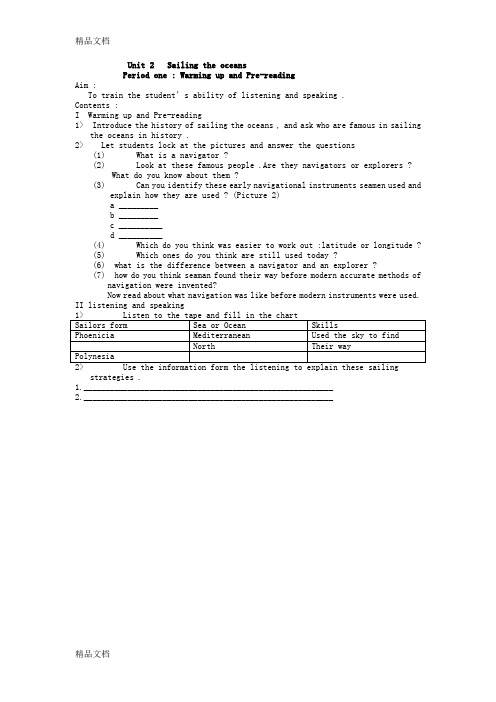
Unit 2 Sailing the oceansPeriod one : Warming up and Pre-readingAim :To train the student’s ability of listening and speaking .Contents :I Warming up and Pre-reading1> Introduce the history of sailing the oceans , and ask who are famous in sailingthe oceans in history .2> Let students lock at the pictures and answer the questions(1) What is a navigator ?(2) Look at these famous people .Are they navigators or explorers ?What do you know about them ?(3) Can you identify these early navigational instruments seamen used andexplain how they are used ? (Picture 2)a _________b _________c __________d __________(4) Which do you think was easier to work out :latitude or longitude ?(5) Which ones do you think are still used today ?(6) what is the difference between a navigator and an explorer ?(7) how do you think seaman found their way before modern accurate methods ofnavigation were invented?Now read about what navigation was like before modern instruments were used. II listening and speakingstrategies .1._________________________________________________________2._________________________________________________________Period two: readingAim :Let students master some language points and understand the text .Contents : Reading : sailing the oceans1> Answer some questions about the text1. How many ways the passage tells us to keep alongside thecoastline .2. When can the sailors use the sun to navigate by ?3. What was the first instrument to measure the sun’s position .4. What proved to be the most accurate and reliable of these earth navigational instruments ?5. When did seamen begin to use the compass ?2> Language points :1. voyage : n. long journey , by sea or in space2. mercy : n. kindness ; forgivenessphr : at the mercy of : under the control of 任由… …的摆布without mercy 毫不留情地The beat was at the mercy of the rapid river .For mercy ‘s sake 请发慈悲For Cod’s sake3. nowhere adv .not anywhere 无处eg : I went nowhere 不知来自哪里,以不知名状态go nowhere vi 无所成,进行得不顺利get sb nowhere 某某事对某人无帮助、元效4. reference n. act of mentioning ; act of looking at forinformation .phr : (1) have reference to 和… …有关系(2) in reference to 关于(3) make (a) reference to 说到谈到(4) reference book 参考书刊号(5) reference material 参考资料(6) with reference to 关于就… …而论 whit reference to the contextvi refer: refer to (a) 指的是(b)参考 (c) 提到谈到refer to A as B 将A称为Beg : Are you referring to me ?In his s peech, he didn’t refer to the problem at all .He cooked dinner by referring to a cookbook .California is referred to as the “G olden State .”5. survival: n. state of continuing to live 生存、幸存survive: vt.sb survive 某人幸存下sth survive 某物保留下来vi. survive sb by 活得比某人长… …survive sth 从… … 中幸存、幸存于…eg : Only one baby survived the terrible car crash .The girl survived her parents .Survivor n. the person or thing of surviving .6. dusk n. time before nightat dusk 在黄昏时刻Period three : comprehending and languageI ComprehendingRead the passage and answer the following questions .1 . What is the use of a bearing circle . astrolabe , quadrant or sextant ?( )What is the use of a compass ? ( )A to set the course of the shipB to measure the position of the shipC to measure the speed of the shipD to tell the time2. Why are speed and time important in working out the longitude of a ship ?3. Why is the position of the sun and various stars useful for working outlatitude ?4. Suppose you were a sea captain aiming to sail round Africa Discuss in groups.(1) what skills would you seek in your sailors ?(2) what problems would you anticipate for this journey ?II Learning about languageDo exercises 1 . 2 and 3Exerise1 Replace the words underlined by ones of similar meaning form the reading passage .1. Seeing the dark clouds above him , George hurried for home .2. Sailing a boat alone far away form the shore made Flora’s parentsworry about her safety .3. Clare , would you please put your bicycle next to the others in theshed ?4. “Why don’t you plot a more simple rout with the smallest numberof sp ots?” asked Mary .5. Setting out on a long journey by sea with unskilled sailors would bedangerous especially if there were no modern navigational instruments . Exercise2 Find the words form the reading passage that are the opposite of these compound words .Nowhere anywhere download upload outward inwardReliable unreliable seaweed land flower shortcoming strong point Exercise3:Complete the following paragraph with the words below .precise outward nowhere awkward reference seaweedaccelerate mercy randomly voyage alongside approximateSamuel the sailor was extremely good at plotting his course using the stars a ________.One day he was determined to set out on a ________across an unknown sea to an unknown continent . He set out with his instruments so he would not be at the _________ Of the sea . He found on his _______journey a rocky island . It seemed to be covered in nests. Suddenly, as Samuel looked , an enormous bird swooped down and picked him up as if he were a/an ______ parcel . It ______its speed and rose straight up into the air so as to reach the _______place on the rocks where its nest lay. Once there, it shook itself and threw Samuel in the ________ direction of the nest . There seemed to be ______to hide but then he noticed lots of ______ on his left and quickly hid under it . The bird landed nearby and pecked ______ at the rocks . Samuel rolled over swiftly and found himself at the edge of the cliff . He looked down slowly with a beating heart. Below him was his boat lying ______the shore! “How lucky I am!”Samuel thought to himself. He then gave a mighty leap and landed in it. Once inside he could safely sail away.Period four : Reading speaking and writingAim :to train th e student’s ability of listening and speaking and writing Contents : some language points1〉starvation : n. suffering or death from lack of food die of starvation starve : vt/vi (使某人)饿死、挨饿starve sb to deathphr: starve for sth to do sthbe starved of vt 缺乏……欠缺……2> gradually : adj not suddenlygradual : adj happening slowlyeg : a gradual increase in populationHer health is gradually improving3> tear : vt/vi 撕裂扯破tear sthsth from /off /out of……adv (away off out up down 连用)phr tear apart 拆散、使分离tear at 用力扯tear down 扯下、撕毁tear into 攻击某人、指责tear off 扯掉、撕掉tear oneself away from 忍痛离开、分离tear up 撕裂、撕毁(合同)4> extreme : adj 1在尽头的eg : the extreme borders of a countryStand at the extreme edge of the bank2.极度的、最大的、极端的an extreme casebe in extreme danger3.极严厉的、猛烈的take extreme measuresn. 极端、极端的、措施、手段等be forced to an unpleasant extreme .5> thirst :n. 口渴、渴望a thirst for knowledgevi 口渴、渴望thirst for 渴望某物to 渴求做……eg : thirst to learnThe story is so gipping ; it makes you thirst for the next episode .II Let students write a report to their leader explaining to him why you think captain Bligh shoulder receive the medal。
(英语)人教版选修9教案:Unit2 Sailing the oceans P2
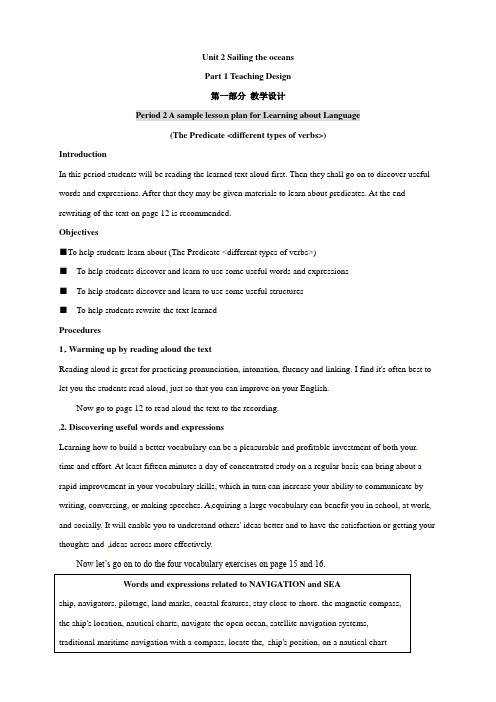
Unit 2 Sailing the oceansPart 1 Teaching Design第一部分教学设计Period 2 A sample lesso n plan for Learning about Language(The Predicate <different types of verbs>)IntroductionIn this period students will be reading the learned text aloud first. Then they shall go on to discover useful words and expressions. After that they may be given materials to learn about predicates. At the end rewriting of the text on page 12 is recommended.Objectives■To help students learn about (The Predicate <different types of verbs>)■To help students discover and learn to use some useful words and expressions■To help students discover and learn to use some useful structures■To help students rewrite the text learnedProcedures1. Warming up by reading aloud the textReading aloud is great for practicing pronunciation, intonation, fluency and linking. I find it's often best to let you the students read aloud, just so that you can improve on your English.Now go to page 12 to read aloud the text to the recording.2. Discovering useful words and expressionsLearning how to build a better vocabulary can be a pleasurable and profitable investment of both yourtime and effort. At least fifteen minutes a day of concentrated study on a regular basis can bring about a rapid improvement in your vocabulary skills, which in turn can increase your ability to communicate by writing, conversing, or making speeches. A cquiring a large vocabulary can benefit you in school, at work, and socially. It will enable you to understand others' ideas better and to have the satisfaction or getting your thoughts and ideas across more effectively.Now let’s go on to do the four vocabulary exercises on page 15 and 16.3. Learning about predicates in grammarone of the two main parts of a sentence (the other being the predicate modifies). The predicate must contain a verb and can containIt hasn’t worked for years.B.4. Revising useful structuresYou are going to read the text on page 12 SAILING THE OCEANS to underline all the predicates to understand their structures and functions.Now you may go on to do the two structure exercises on page 16 and 17.5. Closing down by rewriting the text on page 12ed Radios could b。
英语高三选修九新人教版Unit2:教案【第4课时】Practicing

英语高三选修九新人教版Unit2:教案【第4课时】PracticingThe Fourth Period PracticingLearning about LanguageTeaching Aims:1.Revise the language points learned in the last period.2.Do the exercises in this part.Teaching Important Points:1.Discover useful words and expressions.2.Revise useful structures.Teaching Methods:1.Discussion method.2.Pair work or group work.Teaching Aids:1. a computer;2. coursewareTeaching proceduresStep1 GreetingsGreet the whole class as usual.Step2 RevisionTranslate the following sentences into English:1.我对杰夫真是搞不明白,他忽而对我友好,忽而对我视若路人。
I can’t work out Geoff out; one day he’s friendly, the next day he ignores me completely.2. 他认为美与善是一致的。
He identifies beauty with goodness.3. 到周末你很可能会发现你需要更多东西。
You might well find that you’ll n eed more by the weekend.4. 他们在海上迷失的方向,任凭风和天气的摆布。
They were lost at sea, at the mercy of wind and weather.5. 即便他能通过考试,以后找工作也成问题。
英语高三选修九新人教版unit2:教案【第1课时】speaking

英语高三选修九新人教版Unit2:教案【第1课时】SpeakingThe First Period SpeakingTeaching Aims:a. Key words and expressionsnavigate, navigator, navigation, navigational; explore, explorer, explorationb. Talk about sailing the oceans.Teaching Methods:D iscussion to arouse the students’ interest in sailing and exploring the oceans. Individual, pair or group work to make every student work in class.Teaching Aids:The multimedia; a tape recorder; the blackboardTeaching Procedures:Step1 GreetingsGreet the whole class as usual.Step2 RevisionCheck the homework exercises.Step 3 PresentationPresent the students a map of the world and tell them “Today we are going to learn a new unit “Sailing the oceans”. Then ask them to turn to page 11 and give them a few minutes to have a discussion.Step 4 DiscussionIn pairs discuss the questions on page11.This discussion is intended for students to explore the difference between a navigator and an explorer. This difference is important to establish because it encourages students to appreciate shades of meaning in the definitions f words and also because it establishes the idea of categories.After a few minutes, ask some pairs to speak out their result of the discussion. Then sum up and check the answers.A navigator explores new routes across the sea.An explorer discovers new places on land.A navigator is somebody who finds the position and plots the course of a ship, an aircraft, a car, etc, using maps and instruments. An explorer is somebody who travels into or through a place in order to learn about it. Very often navigators are also explorers.In history there are four famous voyage explorers in the world, including Zheng He in China, James Cook in England, Christopher Columbus in Spain and Abel Tasman in Holland.In this unit we’ll talk about Zheng He, James Cook and some other explorers like Marco Polo and Captain Bligh.Step 5 Pre-speakingAsk the students if they want to know some famous navigators and explorers. Then present them some pictures and some related information about them.1.About Zheng He.2.About Marco Polo3.About James Cook4.About Ferdinand MagellanStep 6 SpeakingAfter showing the students the pictures and their background information, ask the students to think about the question: How do you think seamen found their way before modern accurate methods of navigation were invented? If time is limited, this can be left as their homework. Step 7 Homework1. Read the new words.2. Preview Reading SAILING THE OCEANS on page 12.************************************全单元教学目标概论I. 单元教学目标Ⅱ.目标语言。
Unit2Sailingtheoceans(新课标版高三英语选修九教案教学设计)
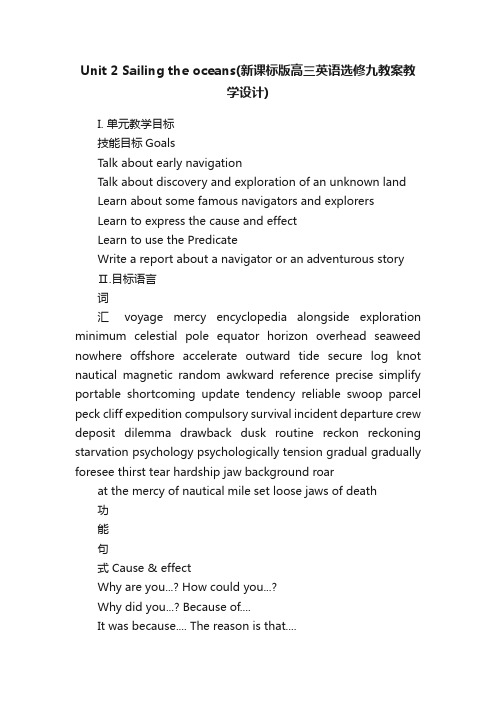
Unit 2 Sailing the oceans(新课标版高三英语选修九教案教学设计)I. 单元教学目标技能目标GoalsTalk about early navigationTalk about discovery and exploration of an unknown landLearn about some famous navigators and explorersLearn to express the cause and effectLearn to use the PredicateWrite a report about a navigator or an adventurous storyⅡ.目标语言词汇voyage mercy encyclopedia alongside exploration minimum celestial pole equator horizon overhead seaweed nowhere offshore accelerate outward tide secure log knot nautical magnetic random awkward reference precise simplify portable shortcoming update tendency reliable swoop parcel peck cliff expedition compulsory survival incident departure crew deposit dilemma drawback dusk routine reckon reckoning starvation psychology psychologically tension gradual gradually foresee thirst tear hardship jaw background roarat the mercy of nautical mile set loose jaws of death功能句式 Cause & effectWhy are you...? How could you...?Why did you...? Because of....It was because.... The reason is that....As he.... Since she....Now that.... Therefore,...He was due to.... It is ..., so I’m afraid....That's why.... He.... so he is ill with fever after the voyage.语法复习谓语(The Predicate)So how did they navigate so well?As you can see from the map we kept to straight course pretty well.The tension in the boat got worse as the supply of food and water gradually disappearSo accomplished navigators were able to use it to plot their position.Captain Cook had led three great Pacific voyages during his life.I’ll go and get ready to begin work.重点句子1. You may well wonder…(p12)2. … show that they were not at the mercy of the sea even though…(p12)3. Sea birds could be used to show the way to land when it was nowhere to be seen. (p12)4. There was no secure method of measuring longitude until the 17th century when the British solved this theoretical problem. (p13)5. Its shortcoming was that it still used the moving ship as one of the fixed points of reference. (p13)6. I am proud to have sailed with Captain Bligh on his journeyof…(p17)7. You could not imagine a more disturbing sight than what we looked like when arriving in Timor over forty days after being set loose in…(p17)Ⅲ..教材分析与教材重组1. 教材分析本单元的中心话题是“Sailing the oceans”,内容涉及海洋航行、人类早期的航海技术、中国历史上最著名的航海家郑和、辛巴达的第一次冒险航行等。
[高中英语]英语高三选修九新人教版Unit2:教案【第2课时】Reading
![[高中英语]英语高三选修九新人教版Unit2:教案【第2课时】Reading](https://img.taocdn.com/s3/m/7c8f4da4e009581b6ad9eb12.png)
英语高三选修九新人教版Unit2:教案【第2课时】ReadingThe Second Period ReadingTeaching Aims:a. Learn and master the key words and expressionsvoyage mercy minimum nowhere pole overhead offshore accelerate outward longitude latitude precise simplify portable shortcoming updated tendency reliableat the mercy of, even though, work out, be used to, in relation to, aim to , …b. Train the students’ reading ability. Let the students have some knowledge of early navigational methods. Explain how seamen explored the oceans and what kind of navigational instruments were used to sailors before the 17th century when they were navigating the open seas without seeing the land.Teaching Difficult Points:a.How to help the students understand the reading passage better.b.How to improve the students’ reading ability.Teaching Methods:a.Scanning the text to get the general idea of it.b.Carefully reading to finish the Comprehending exercises on page 14.c.Discussion after reading to make the students understand the text better.Teaching Aids:The multimedia; a tape recorder; the blackboardTeaching procedures & waysStep1 GreetingsGreet the whole class as usual.Step2 RevisionCheck the homework exercises.Step3 Pre-readingShow the students some pictures to see if they can identify the early navigational instruments seamen used and explain how they used.Step 4 DiscussionDiscuss the questions on page11.Step 5 Listening and comprehendingAfter listening to the contents of the text do the comprehending exercises on page 14&15.Step 6 ExplanationAfter comprehending, it is a good time to deal with the new words and language points in this part, esp. the following:voyage mercy minimum nowhere pole overhead offshore accelerate outward longitude latitude precise simplify portable shortcoming updated tendency reliableat the mercy of, even though, work out, be used to, in relation to, aim to ,Step7 DiscussionLet’s the students have a discussion by working in pairs or in groups.Topic: Imagine you are on a boat with twenty-nine other people. You have a small box for your personal things but it can only hole ten items. What would you need for a week’s journey across the North Sea to England?Suggested Answer:Step8 SummaryThis reading explains how seamen explored the oceans and what kind of navigational instruments were used to sailors before the seventeenth century when they were navigating the open seas without seeing the land.Step9 HomeworkFinish the exercises about using words and expression on page61.************************************ 全单元教学目标概论I. 单元教学目标Ⅱ.目标语言。
高中英语(人教版)选修九Unit2Sailingtheoceans同步课件教案课件教案和测试(参考)
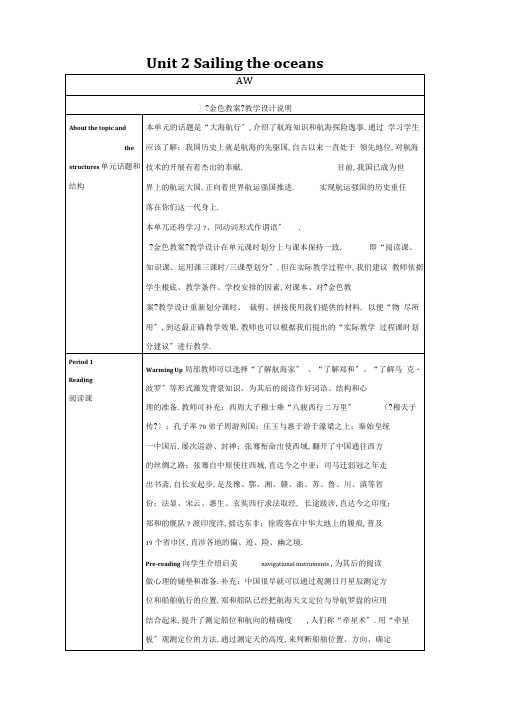
Unit 2 Sailing the oceansPart 1 Teaching Design第一局部教学设计Period 1 A sample lesson plan for reading(SAILING THE OCEANS)IntroductionIn this period, after the warming up, students will first be guided to learn about navigational instruments.Then they will be helped to read an exposition about sailing the oceans.Three “WarmingUp" designs are presented in this book for teachers reference. Computer and overhead projector may be used to a id the teaching and learning.Objectives■To help students learn to express causes and effects■To help students learn to read an exposition about sailing the oceans■To help students better understand a sailing〞■To help students learn to use some important words and expressions■To help students identify examples of the future passive voice in the textFocusAidsMultimedia facilities, tape-recorder, photos, diagramsProcedures1.Warming up(1)Warming up by leaning about navigatorA navigator is the person onboard a ship responsible for the navigation of the vessel. On aircraft, the position may also be referred to as a flight officer. The navigator's responsibilities include planning the journey, advising the captain (or pilot) while en route, and ensuring that hazards or obstacles are avoided.(2)Warming up by talking about Zheng He's Seven VoyagesIn July 11, 1405, the eunuch Zheng He of the Ming Dynasty royal court set out on his first overseas voyage.In the following 28 years, this navigator proceeded to carry out six more voyages, accompanied by a huge entourage of nearly 30,000 people. By traveling throughout Southeast Asia, and around the Indian Ocean to the Red Sea and East Africa, he also landed at over thirty different nations. He was the earliest largest scale navigation in world history, coming more than half a century earlier than Columbus'famous exploits...(3)Warming up by looking and listeningHello, class. Do you know this man? Yes, he is Marco Polo.Marco Polo (1254-1324), is probably the most famous Westerner traveled on the Silk Ro ad. He excelled all the other travelers in his determination, his writing, and his influence. His journey through Asia lasted 24 years. He reached further than any of his predecessors, beyond Mongolia to Chin a. He became a confidant of Kublai Khan (1214-1294). He traveled the whole of China and returned to tell the tale, which became the greatest travelogue.2.Pre-reading by learning about navigational instruments◊ artificial horizon, flight indicator, gyro horizon - a navigational instrument based on a gyroscope;provides an artificial horizon for the pilot◊ compass - navigational instrument for finding directions◊ depth finder - navigational instrument used to measure the depth of a body of water (as by ultrasound or radar)◊inclinometer - an instrument showing the angle that an aircraft makes with the horizon◊instrument - a device that requires skill for proper use◊asdic, echo sounder, sonar - a measuring instrument that sends out an acoustic pulse in water and measures distances in terms of the time for the echo of the pulse to return; sonar is an acronym for sound navigation ranging; asdic is an acronym for anti-submarine detection investigation committee3.Reading for formsRead the text SAILING THE OCEANS on page 12 to: cut/ the sentence into thought groups, blacken the predicative, darken the connectives and underline all the useful expressions.4.Copying useful expressions and making sentencesYou are going to copy in your notebook all the useful expressions and make sentences of your own with them.5. Transforming information Next you are going to read the text again to complete the chart below.7. Making a diagram of SAILING THE OCEAN8. Closing down by answering comprehension questions1. What is the main topic of this passage?A. The voyages of the travelers before the 17th centuryB. How to plot a ship ' s position on a mapC. How did ancient men navigate so wellD. Use nature to aid navigation2. Ancient navigators use navigational instruments to help them.A. find celestial bodiesB. predict the weatherC. explore the seaD. find latitude…,rather •・ as one of the points of3.The author of the passage implies that the ancient navigators were.A. hard-workingB. braveC. intelligentD. energetic4.According to the passage,.A.the ancient accomplished navigators were able to use South Star to plot their positions .B.Sea birds could be used to show the way to land when it was nowhere to be seen .C.Wise seamen used the snows to direct their sailing .D.The sextant proved to be the most accurate and reliable of these early navigational instruments. (Keys: BDCB )。
(英语)人教版选修9教案:Unit2 Sailing the oceans P1
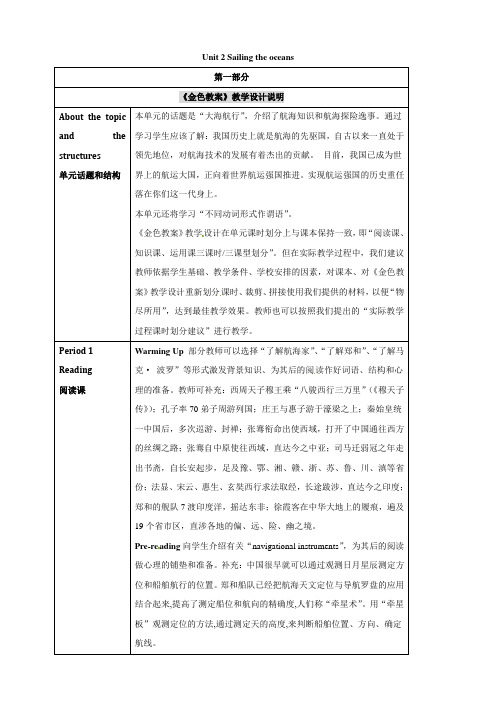
Unit 2 Sailing the oceans设计在单元课时划分上与课本保持一致,教学设计重新划分波罗”等形式激发背景知识、为其后的阅读作好词语、结构和心Pre-re将Workbook 的READING AND LISTENING和TALKING整合在一起重组后Part 1 Teaching Design第一部分 教学设计Period 1 A sample lesson plan for reading(SAILING THE OCEANS)IntroductionIn this period, after the warming up, students will first be guided to learn about navigational instruments. Then they will be helped to read an exposition about sailing the oceans.Three “Warming Up” designs are presented in this book for teachers’ reference. Computer andoverhead projector may be used to aid the teaching and learning.Objectives■ To help students learn to express causes and effects■ To help studen ts learn to read an exposition about sailing the oceans■ To help students better understand “sailing ”■ To help students learn to use some important words and expressions■ To help students identify examples of the future passive voice in the textFocusin the 12th century they couldAidsMultimedia facilities, tape-recorder, photos, diagramsProcedures1.Warming up⑴Warming up by leaning about navigatorA navigator is the person onboard a ship responsible for the navigation of the vessel. On aircraft, the position may also be referred to as a flight officer. The navigator's responsibilities include planning the journey, advising the captain (or pilot) while en route, and ensuring that hazards or obstacles are avoided.⑵Warming up by talking about Zheng He's Seven VoyagesIn July 11, 1405, the eunuch Zheng He of the Ming Dynasty royal court set out on his first overseas voyage. In the following 28 years, this navigator proceeded to carry out six more voyages, accompanied by a huge entourage of nearly 30,000 people. By traveling throughout Southeast Asia, and around the Indian Ocean to the Red Sea and East Africa, he also landed at over thirty different nations. He was the earliest largest scale navigation in world history, coming more than half a century earlier than Columbus'famous exploits...⑶Warming up by looking and listeningHello, class. Do you know this man? Yes, he is Marco Polo.Marco Polo (1254-1324), is probably the most famous Westerner traveled on the Silk Ro ad. He excelled all the other travelers in his determination, his writing, and his influence. His journey through Asia lasted 24 years. He reached further than any of his predecessors, beyond Mongolia to Chin a. He became a confidant of Kublai Khan (1214-1294). He traveled the whole of China and returned to tell the tale, which became the greatest travelogue.2. Pre-reading by learning about navigational instruments◇artificial horizon, flight indicator, gyro horizon - a navigational instrument based on a gyroscope; provides an artificial horizon for the pilot◇compass - navigational instrument for finding directions◇depth finder - navigational instrument used to measure the depth of a body of water (as by ultrasound or radar)◇inclinometer - an instrument showing the angle that an aircraft makes with the horizon◇instrument - a device that requires skill for proper use◇asdic, echo sounder, sonar - a measuring instrument that sends out an acoustic pulse in water and measures distances in terms of the time for the echo of the pulse to return; sonar is an acronym for sound navigation ranging; asdic is an acronym for anti-submarine detection investigation committee3. Reading for formsRead the text SAILING THE OCEANS on page 12 to: cut/ the sentence into thought groups, blacken the predicative, darken the connectives and underline all the useful expressions.4. Copying useful expressions and making sentencesYou are going to copy in your notebook all the useful expressions and make sentences of your own with them.islands, land close bycarry ships to their destination, explore the seas,reduce t he tendency5. Transforming informationNext you are going to read the text again to complete the chart below.6. Reading the text again to decide on the type of writing and summary of SAILING THE OCEANType of writing and summary of SAILING THE OCEAN7.Making a diagram of SAILING THE OCEAN8. Closing down by answering comprehension questionsow did ancient men navigate so well。
人教版高中英语选修9Unit2《Sailingtheoceans》word单元教案

⼈教版⾼中英语选修9Unit2《Sailingtheoceans》word单元教案Unit Two Sailing the oceans课程标准中的内容标准:本单元的话题是围绕“航海、发现探索未知的⼤陆”的主题。
内容涉及航⾏、⼈类早期的航海技术、中国历史上最著名的航海家郑和、⾟巴达的第⼀次冒险航⾏等。
教学细⽬:1、(情感⽬标)通过阅读,了解⼈类早期的航海术、历史上著名的航海家、探险家及著名的航海事迹。
2、(交际)通过听说学习表⽰“原因与结果”的⽤语。
3、(词汇)通过阅读、师⽣互动掌握本单元的教学⽬的和要求中的词汇。
4、(写作)通过阅读和书⾯训练,学习并掌握正式信件的写法和⽤语。
5、(语法)通过书⾯训练,深⼊理解和进⼀步复习谓语的⽤法。
Part One 单元重点知识点I. 重点单词和词组P. 1Words: navigate, navigator, navigation, navigational; explore, explorer, explorationPhrases: the difference between… and …P.2Words: voyage mercy minimum nowhere pole overhead offshore accelerate outward longitude latitude precise simplify portable shortcoming updatedtendency reliablePhrases: at the mercy of, even though, work out, be used to, in relation to, aim to, …P.3Words: incident departure crew deposit dilemma drawback dusk routine pretty starvation extreme psychologically tension gradually foresee thirsthardshipPhrases: in addition cope with set loose the jaws of deathII. 重点句型见表1.1.7III. 重点语法复习谓语:谓语⽤来说明主语的动作或状态,由动词或动词词组担任。
人教版高中英语选修9《Unit2Sailingtheoceans》教案
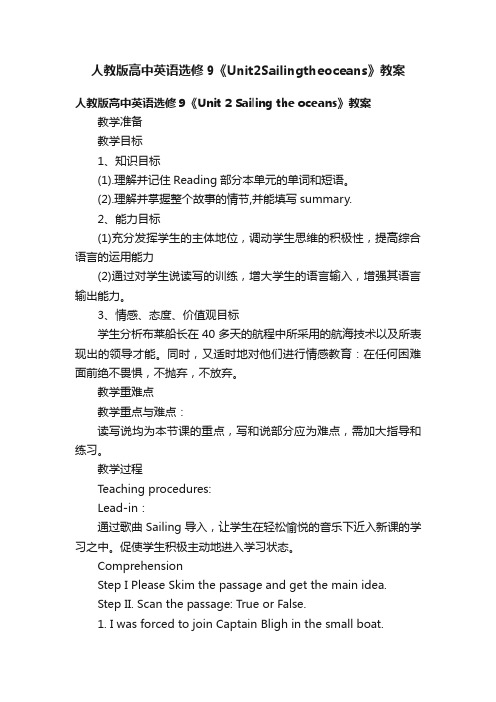
人教版高中英语选修9《Unit2Sailingtheoceans》教案人教版高中英语选修9《Unit 2 Sailing the oceans》教案教学准备教学目标1、知识目标(1).理解并记住Reading部分本单元的单词和短语。
(2).理解并掌握整个故事的情节,并能填写summary.2、能力目标(1)充分发挥学生的主体地位,调动学生思维的积极性,提高综合语言的运用能力(2)通过对学生说读写的训练,增大学生的语言输入,增强其语言输出能力。
3、情感、态度、价值观目标学生分析布莱船长在40多天的航程中所采用的航海技术以及所表现出的领导才能。
同时,又适时地对他们进行情感教育:在任何困难面前绝不畏惧,不抛弃,不放弃。
教学重难点教学重点与难点:读写说均为本节课的重点,写和说部分应为难点,需加大指导和练习。
教学过程Teaching procedures:Lead-in:通过歌曲Sailing导入,让学生在轻松愉悦的音乐下近入新课的学习之中。
促使学生积极主动地进入学习状态。
ComprehensionStep I Please Skim the passage and get the main idea.Step II. Scan the passage: True or False.1. I was forced to join Captain Bligh in the small boat.2. After the crew took over the ship “Bounty”, Captain Bligh was allowed to take with him a chart , a compass and a quadrant.3. It was very difficult for us to get a correct reading from the quadrant as the boat moved constantly during the course.4. Captain Bligh used a system called “dead reckoning” and he knew there was land directly southwest of their original position.5. Captain Bligh was as weak as the rest of us but he was determined not to give up.6. Captain Bligh kept us busy and tried to take our minds off our stomachs and thirst all the way.7. We finally escaped the jaws of death and arrived in Timor over fifty days after being set loose in our small boat.Step III. Group work: further reading.When captain Blight returned home he was honored as a hero. Discuss in groups whether he should receive a special medal or not.Step IV. Affective educationAfter learning the text, as senior three students, what can we learn from Captain Blight in our life?Step V. Summary:I am _____ to have sailed with Captain Bligh on his journey of over40 days through about4,000 miles in an open boat ______the Pacific Ocean in 1789.In the beginning, on our ________(depart), some of the crew took _____theship and the captain ___________(deposit) into a small boat. Thus we werecaught _____a dilemma. We decided to stick with him _______thick and thin though we seemed to face _____uncertaindeath.During the long and toughjourney, we encountered manyunexpected hardships. Despite _____(lack) of foodand water, he kept us _______(occupy) and cheerful to take our minds ____troubles. All the way he taught us how to cope _______various situations. Finallythey arrived at Timor __________(success) andthey were honored as _______(hero).The story shows that one man’sspirit and his determination should not ________ (defeat) by circumstances.Complexsentences(分析并翻译1-2个长难句)Challengeyourself!---Grammar Filling1. I’m proud to have sailed withCaptain Blight ____his journey of over 40 days _________about 4,000miles ____anopen small boat _______ the Pacific Ocean.2. On our _________(depart) from T ahiti, some crew took _____the ship. And those of us onboard ____________(catch) in a dilemma.3. As you can see from the map we kept_____a straight course pretty well.4. The captain kept us busy________ (read) the tables to work out our position .5. It was the extreme lack of waterthat was hard to cope with ______________ (psychology)6.He kept us busy and tried to take our minds课后习题Challenge yourself!---Grammar Filling1. I’m proud to have sailed with Captain Blight ____his journey of over 40 days _________about 4,000miles ____an open small boat _______ the Pacific Ocean.2. On our _________(depart) from T ahiti, some crew took _____the ship. And those of us on board ____________(catch) in a dilemma.3. As you can see from the map we kept _____a straight course pretty well.4. The captain kept us busy________ (read) the tables to work out our position .5. It was the extreme lack of water that was hard to cope with ______________ (psychology)6.He kept us busy and tried to take our minds _____our __________(stomach).。
(英语)人教版选修9教案:Unit2 Sailing the oceans S2

Unit 2 Sailing the oceansPart 2 Teaching Resources第二部分教学资源Section 2 Notes to difficult sentences from Unit 2Sailing the oceans1.So accomplished navigators were able to use it to plot their positio ns.熟练的领航员就能够用它来确定自己的位置。
句中accomplished是形容词,意思是“优秀的,熟练的”,作定语修饰其后的名词。
Accomplished 的用法如下:已完成的; 已达到的:accomplished facts 既成事实;学识渊博的, 技术高超的, 有成就的:an accomplished cook 厨艺精湛的厨师,Judy is accomplished in English teaching. 茱蒂擅长英语教学;有教养的, 优雅的:an accomplished lady 才女2.On a clear day especially during the summer the sailors could use the sun overhead at midday to navigate by.在晴朗的日子,尤其是在夏天,水手可以使用正午头顶的太阳来引导他们航行。
句中to navigate by作目的状语,修饰谓语动词,其中的by是介词,它的逻辑宾语是前面的the sun。
类似的例句有:I have no topics to write about.He found some pens to write with. He is not the person to get along with.3.Sea birds could be used to show the way to land when it was nowhere to be seen.看不到陆地的时候,可以利用海鸟来定位通向陆地的方向。
英语高三选修九新人教版Unit2:教案【第3课时】Extensive Reading
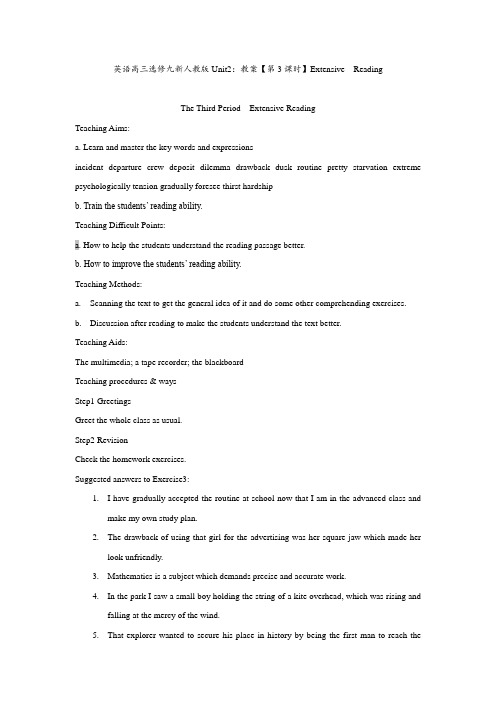
英语高三选修九新人教版Unit2:教案【第3课时】Extensive ReadingThe Third Period Extensive ReadingTeaching Aims:a. Learn and master the key words and expressionsincident departure crew deposit dilemma drawback dusk routine pretty starvation extreme psychologically tension gradually foresee thirst hardshipb. Train the students’ reading ability.Teaching Difficult Points:a. How to help the students understand the reading passage better.b. How to improve the students’ reading ability.Teaching Methods:a.Scanning the text to get the general idea of it and do some other comprehending exercises.b.Discussion after reading to make the students understand the text better.Teaching Aids:The multimedia; a tape recorder; the blackboardTeaching procedures & waysStep1 GreetingsGreet the whole class as usual.Step2 RevisionCheck the homework exercises.Suggested answers to Exercise3:1.I have gradually accepted the routine at school now that I am in the advanced class andmake my own study plan.2.The drawback of using that girl for the advertising was her square jaw which made herlook unfriendly.3.Mathematics is a subject which demands precise and accurate work.4.In the park I saw a small boy holding the string of a kite overhead, which was rising andfalling at the mercy of the wind.5.That explorer wanted to secure his place in history by being the first man to reach theSouth Pole.Step3 Readinga. Listen to the passage and then let them do some true or false questions according to the text.1. I was forced to join Captain Bligh in the small boat.2. After the crew took over the ship “Boundy”, Captain Bligh was allowed to take with him a chart , a compass and a quadrant.3. It was very difficult for us to get a correct reading from the quadrant as the boat moved constantly during the course.4. Captain Bligh used a system called “dead reckoning” and he knew there was land directly southwest of their original position.5. We completely believed Captain Bligh when he talked hopefully about what we would do when we got back to England.6. Captain Bligh was as weak as the rest of us but he was determined not to give up.7. Captain Bligh kept us busy and tried to take our minds off our stomach and thirst all the way.8. We finally escaped the jaws of death and arrived in Timor over fifty days after being set loose in our small boat.Answers: (FFTFFTTF)b. Give the students a few minutes to read the passage again and then get the general idea of the text.This is the storey of Captain Bligh’s amazing journey across the Pacif ic Ocean in an open boat with his followers after another group of sailors under Fletcher Christian had taken over the ship. Later Captain Bligh and his men made for the island of Timor using a combination of navigational skill and “dead reckoning”, which is guessing the correct direction. The voyage lasted over 40 days and was one of the greatest examples of survival at sea.c. Explain some difficult sentences, phrases and words.Key phrases:1. in addition 另外There was an earthquake and, in addition, there were tsunamis.除了地震之外,还有海啸。
[高中英语]新人教版英语高三选修9:Unit 2教案【第6课时】
![[高中英语]新人教版英语高三选修9:Unit 2教案【第6课时】](https://img.taocdn.com/s3/m/009cc9e3f242336c1fb95e41.png)
新人教版英语高三选修9:Unit 2教案【第6课时】The Sixth Period GrammarThe Predicate and AgreementTeaching Aims:1.Revise one of the sentence elements ---the Predicate and do plenty of exercises to consolidatewhat we have revise.2.Study Agreement to improve th e students’ ability to use the English language.Teaching Important Points:1.How to choose the proper form of the Predicative in order to express what we want to say.2.Help the students to make a summary of the usage of agreement.Teaching Difficult Points:How to choose a proper predicate according to its subject.Teaching Methods:1.Discussion method to let the students have a clear understanding.2.Pair work or group work to make every student engaged in all the activities in class. Teaching Aids:1. a computer;2. coursewareTeaching proceduresStep1 GreetingsGreet the whole class as usual.Step2 RevisionCheck the homework exercises.Step3 Grammar: the PredicateA. Show the students some sentences and ask them to discuss and tell what member of the sentence each underlined part is.①What nationality is he?②That’s something we have always to keep in mind.③John is the second to learn about it.④Diamonds are precious.⑤The play we saw last Saturday is moving and we were all moved.⑥All we can do is to go and meet him.⑦He has been away for 3 years.⑧She is not what she used to be.B. Something about the predicate:谓语谓语用来说明主语的动作或状态,由动词或动词词组担任.有四个要点,举例归纳如下:1. 动词可分为及物动词、不及物动词和连系动词.1)需要跟有宾语的动词叫及物动词,及物动词后可跟一个宾语、直接宾语和间接宾语或一个宾语带宾语补足语.例如:直接宾语Children seek independence.The trial raised a number of questions.He has always liked Mr. Philips.He made the shortest speech I have ever heard.A couple were having a drink at a table by the windowHe took photographs of Vita in her summer house直接宾语和间接宾语They gave us a wonderfully warm welcome.Mr Schell wrote a letter the other day to the New York Times.(… wrote the New York Times a letter.)I took out the black box and handed it to her. (…handed her the box.)l had lent my apartment to a friend for the weekend.He left the note for he r on the table.一个宾语带宾语补足语Willis’s jokes made her uneasy.Last year they made him captain of the TeamThe people named the place “Turbo Kutu”.I thought it right to go there without delay.Have you found it difficult to speak?2)不需要跟有宾语的动词叫不及物动词.例如:Her whole body ached.Donald was lying on the bed.Bob coughed all night.All the leaves have fallen and winter is coming.I will travel south this summer and won’t come back to my office until the end of August.有几个不及物动词后可以跟有与之同形的名词,这叫同源宾语.例如:They are living a peaceful life. (=They are living peacefully.)He died a heroic death . (=He died heroically.)The girl laughed a merry laugh. (=The girl laughed merrily.)He sighed a deep sigh. (=He sighed deeply.)许多动词往往既是不及物动词又是及物动词.例如:Gus asked me whether I’d like to have dinner with him. I accepted.(vi.)I accepted the invitation. (vt.)He painted every day. (vi.)He paints vivid portraits of friends and acquaintances. (vt.)He ran as fast as he could. (vi.)She ran a hotel in the centre of the city. (vt.)Father never smoked or drank all his life. (vi.)He drank a good deal of coffee. (vt.)At last she thanked them and left. (vi.)A11 I know is that Michael and I never left the house. (vt.)3 ) 连系动词虽具有词汇意义,但需要带有表语才能构成动词谓语.例如:The station seems a very small one.They haven’t remained loyal to the government.Their hall was larger than his whole flat.The task of inspecting it proved to be exciting and interesting.It sounds unnatural to us.My memories of a London childhood are happy ones.His body was the color of bronze.2动词词组或称短语动词,可以扩展或改变动词的意义,它们的构成是:·动词+副词Mary went away for a few days.·动词+介词The other day I came across a letter from Brunei written in the last year of his life.·动词+副词+介词You may have come up against unexpected difficulties.3情态动词与动词连用构成的谓语.例如:I must leave very soon.The rich ought to pay tuition fees for their children.You may have heard of him.You should not have done so.Step 4 PracticeChoose the best answers.1. ---You haven't said a word about my new coat, Brenda. Do you like it?---I'm sorry I _____anything about it sooner. 1 certainly think it's pretty on you.A .wasn't saying B. don't say C. won't say D. didn't say2. --- Is John coming by train?---He should, but he _____ not. He likes driving his car.A. mustB. canC. needD. may3. I wonder why Jenny _____us recently. We should have heard from her by now.A. hasn't writtenB. doesn't writeC .won’t write D. hadn't written4. The evening news comes on at seven o'clock and _____only thirty minutes.A. keepsB. completesC. finishesD. lasts5. ---Has Sam finished his homework today?---I have no idea. He_____ it this morning.A. didB. has doneC. was doingD. had done6. The forest guards often find campfires that have not been _____ completelyA. turned downB. put outC. put awayD. had done7. The first use of atomic weapons was in 1945 and their power__ increased enormously ever since.A. isB. wasC. hasD. had been8. 1 don't _____ rock’ n’ roll. It's much too noisy for my taste.A. go afterB. go away withC. go intoD. go in for9. The teacher, with 6 girls and 8 boys of her class, _____visiting a museum when the earthquake struck.A .was B. were C. had been D. would be10. --- Who is the girl standing over there?---Well, if you _____ know, her name is Mary.A. mayB. canC. mustD. shall.11. On hearing the news of the accident in the coal mine, she _____ pale.A. gotB. changesC. wentD. appears12. Mary kept weighing herself to see how much_____ she was getting.A. heavierB. heavyC. the heavierD. the heaviest13. Happy birthday. Alice! So you have_____ twenty-one already.A. goneB. turnedC. grownD. passed14. The flowers______ sweet in the botanic garden, which attracted the visitors to the beauty of nature.A. to smellB. smelledC. smellingD. are smelled15. Having a trip abroad is certainly nice for old couples, but it remains _____ whether they will enjoy it.A. to be seenB. to seeC. seeingD. seen1-5 DDADC 6-10 BCDAC 11-15 CABBAStep 5 Grammar: AgreementShow the students something about agreement:主谓一致1.并列结构作主语谓语用复数2.主谓一致中的就近原则3.谓语动词与前面的主语一致4.谓语需用单数5.指代意义决定谓语的单复数6.与后接名词或代词保持一致Step 6 Practice1. More than one person _______ killed in the accident. ( be )2.More questions than one ______ been asked. ( have)3.Part of part of the meat _______spoilt. ( be )4.Most of the books _________ missing. ( be )5. The number of errors ______ surprising.6. Jane and Mary ______ alike.7. The crowd ______running for their lives.8. The iron works _____ hidden behind the trees.9. Either your students or Mr. Wang ______ this.10. His family ____ going to have a long journey.11. The whole family_____ watching TV.12. The population of China ____ very large, and eighty percent of the population in China _____ farmers.13. The police _____ searching for him.14. A sheep ____ over there.15. Some sheep _____ over there.16. The doctor’s _____ on the side of the street.17. My uncle’s _____ not far from here.18. Richardson’s _____ a lo t of imported goods to sell.Ask the students to finish the exercises.Suggested answers:1. was2. have3. was4. were5. was6. look7. were8. was9. knows 10. is 11. are 12. is , are 13. are 14. is 15 are 16. is 17. is 18. areStep 7 Summary and Homework1.Do what we learn today.2.Do the exercise about Using Structures on page 62.********全单元教学目标概论*********************。
(英语)人教版选修9教案:Unit2 Sailing the oceans P2
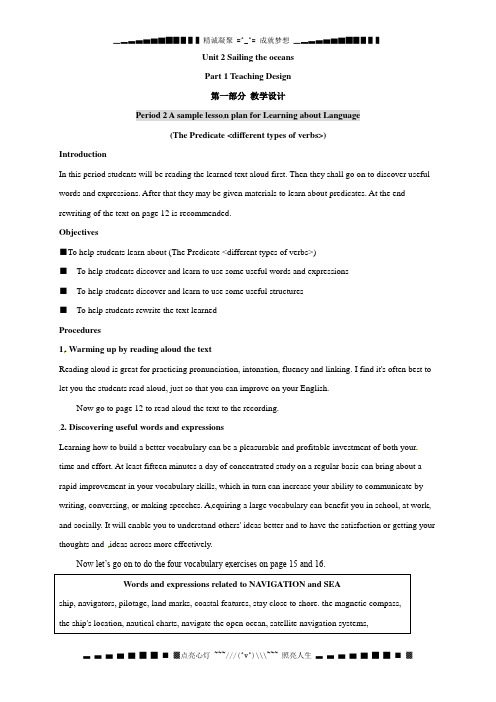
Unit 2 Sailing the oceansPart 1 Teaching Design第一部分教学设计Period 2 A sample lesso n plan for Learning about Language(The Predicate <different types of verbs>)IntroductionIn this period students will be reading the learned text aloud first. Then they shall go on to discover useful words and expressions. After that they may be given materials to learn about predicates. At the end rewriting of the text on page 12 is recommended.Objectives■To help students learn about (The Predicate <different types of verbs>)■To help students discover and learn to use some useful words and expressions■To help students discover and learn to use some useful structures■To help students rewrite the text learnedProcedures1. Warming up by reading aloud the textReading aloud is great for practicing pronunciation, intonation, fluency and linking. I find it's often best to let you the students read aloud, just so that you can improve on your English.Now go to page 12 to read aloud the text to the recording.2. Discovering useful words and expressionsLearning how to build a better vocabulary can be a pleasurable and profitable investment of both yourtime and effort. At least fifteen minutes a day of concentrated study on a regular basis can bring about a rapid improvement in your vocabulary skills, which in turn can increase your ability to communicate by writing, conversing, or making speeches. A cquiring a large vocabulary can benefit you in school, at work, and socially. It will enable you to understand others' ideas better and to have the satisfaction or getting your thoughts and ideas across more effectively.Now let’s go on to do the four vocabulary exercises on page 15 and 16.3. Learning about predicates in grammarone of the two main parts of a sentence (the other being the predicate modifies). The predicate must contain a verb and can containIt hasn’t worked for years.B.4. Revising useful structuresYou are going to read the text on page 12 SAILING THE OCEANS to underline all the predicates to understand their structures and functions.Now you may go on to do the two structure exercises on page 16 and 17.5. Closing down by rewriting the text on page 12ed Radios could b。
人教版高中英语选修9《Unit 2 Sailing the oceans》教案
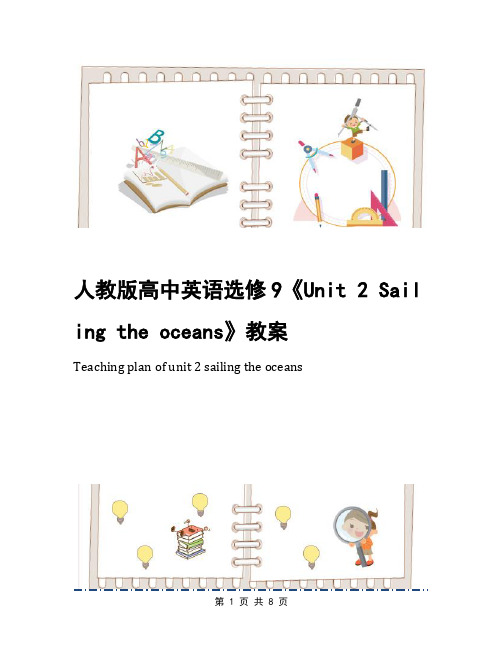
人教版高中英语选修9《Unit 2 Sail ing the oceans》教案Teaching plan of unit 2 sailing the oceans人教版高中英语选修9《Unit 2 Sailing the oceans》教案前言:英语作为在许多国际组织或者会议上都是必需语言,几乎所有学校选择英语作为其主要或唯一的外语必修课。
英语教学涉及多种专业理论知识,包括语言学、第二语言习得、词汇学、句法学、文体学、语料库理论、认知心理学等内容。
本教案根据英语课程标准的要求和教学对象的特点,将教学诸要素有序安排,确定合适的教学方案的设想和计划、并以启迪发展学生智力为根本目的。
便于学习和使用,本文档下载后内容可按需编辑修改及打印。
教学准备教学目标1、知识目标(1).理解并记住Reading部分本单元的单词和短语。
(2).理解并掌握整个故事的情节,并能填写summary.2、能力目标(1)充分发挥学生的主体地位,调动学生思维的积极性,提高综合语言的运用能力(2)通过对学生说读写的训练,增大学生的语言输入,增强其语言输出能力。
3、情感、态度、价值观目标学生分析布莱船长在40多天的航程中所采用的航海技术以及所表现出的领导才能。
同时,又适时地对他们进行情感教育:在任何困难面前绝不畏惧,不抛弃,不放弃。
教学重难点教学重点与难点:读写说均为本节课的重点,写和说部分应为难点,需加大指导和练习。
教学过程Teaching procedures:Lead-in:通过歌曲Sailing导入,让学生在轻松愉悦的音乐下近入新课的学习之中。
促使学生积极主动地进入学习状态。
ComprehensionStep I Please Skim the passage and get the main idea.Step II. Scan the passage: True or False.1.I was forced to join Captain Bligh in the small boat.2.After the crew took over the ship “Bounty”, Captain Bligh was allowed to take with him a chart , a compass and a quadrant.3.It was very difficult for us to get a correct reading from the quadrant as the boat moved constantly during the course.4.Cap tain Bligh used a system called “dead reckoning” and he knew there was land directly southwest of their original position.5.Captain Bligh was as weak as the rest of us but he was determined not to give up.6.Captain Bligh kept us busy and tried to takeour minds off our stomachs and thirst all the way.7.We finally escaped the jaws of death andarrived in Timor over fifty days after being set loose in our small boat.Step III. Group work: further reading.When captain Blight returned home he was honored as a hero. Discuss in groups whether he should receive a special medal or not.Step IV. Affective educationAfter learning the text, as senior three students, what can we learn from Captain Blight in our life?Step V. Summary:I am _____ to have sailed with Captain Bligh on his journey of over40 days through about4,000 miles in an open boat ______the Pacific Ocean in 1789.In the beginning, on our ________(depart), some of the crew took _____theship and the captain___________(deposit) into a small boat. Thus we werecaught _____a dilemma. We decided to stick with him _______thick and thin though we seemed to face_____uncertaindeath.During the long and toughjourney, we encountered many unexpected hardships. Despite _____(lack) of foodand water, he kept us _______(occupy) and cheerful to take our minds ____troubles. All the way he taught us how to cope _______various situations. Finallythey arrived at Timor __________(success)andthey were honored as _______(hero).The story shows that one man’ssp irit and his determination should not ________ (defeat) by circumstances.Complexsentences(分析并翻译1-2个长难句)Challengeyourself!---Grammar Filling1.I’m proud to have sailed withCaptain Blight ____his journey of over 40 days _________about4,000miles ____anopen small boat _______ the Pacific Ocean.2.On our _________(depart) from Tahiti, some crew took _____the ship. And those of us onboard____________(catch) in a dilemma.3.As you can see from the map we kept_____a straight course pretty well.4.The captain kept us busy________ (read) the tables to work out our position .5.It was the extreme lack of waterthat was hard to cope with ______________ (psychology)6.He kept us busy and tried to take our minds课后习题Challenge yourself!---Grammar Filling1.I’m proud to have sailed with Captain Blight ____his journey of over 40 days _________about4,000miles ____an open small boat _______ the Pacific Ocean.2.On our _________(depart) from Tahiti, some crew took _____the ship. And those of us on board____________(catch) in a dilemma.3.As you can see from the map we kept _____a straight course pretty well.4.The captain kept us busy________ (read) the tables to work out our position .5.It was the extreme lack of water that was hard to cope with ______________ (psychology)6.He kept us busy and tried to take our minds_____our __________(stomach).-------- Designed By JinTai College ---------。
- 1、下载文档前请自行甄别文档内容的完整性,平台不提供额外的编辑、内容补充、找答案等附加服务。
- 2、"仅部分预览"的文档,不可在线预览部分如存在完整性等问题,可反馈申请退款(可完整预览的文档不适用该条件!)。
- 3、如文档侵犯您的权益,请联系客服反馈,我们会尽快为您处理(人工客服工作时间:9:00-18:30)。
英语高三选修九新人教版Unit2:教案Unit2《Sailing the oceans》教案(2)(新人教版选修9)Part One: Teaching DesignPeriod 1: A sample lesson plan for reading(SAILING THE OCEANS)AimsTo help students read about sailing the oceansTo help students learn about the predicateProcedures■Warming up by leaning about navigatorWhat is a navigator?A navigator is the person onboard a ship responsible for the navigation of the vessel. On aircraft, the position may also be referred to as a flight officer. The navigator's responsibilities include planning the journey, advising the captain (or pilot) while en route, and ensuring that hazards or obstacles are avoided.What is exploration?Exploration is the act of searching or traveling for the purpose of discovery, e.g. of unknown regions, including space (space exploration), or oil, gas, coal, ores, water (also known as prospecting), or information.Exploration has existed as long as human beings, but its peak is seen as being during the Age of Exploration when European navigators travelled around the world.In scientific research, exploration is one of three purposes of research (the other two being description and explanation). Exploration is the attempt to develop an initial, rough understanding of some phenomenon.■Warming up by tal king about Zheng He's Seven V oyagesIn July 11, 1405, the eunuch Zheng He of the Ming Dynastyroyal court set out on his first overseas voyage.In the following 28 years, this navigator proceeded to carryout six more voyages, accompanied by a huge entourage of nearly 30,000 people. By traveling throughout Southeast Asia, and around the Indian Ocean tothe Red Sea and East Africa, he also landed at over thirty different nations.He was the earliest largest scale navigation in world history, coming more than half a century earlier than Columbus'famous exploits...■Warming up by looking and listeningHello, class. Do you know this man? Yes, he is Marco Polo.Marco Polo (1254-1324), is probably the most famous Westerner traveled on the Silk Road. He excelled all the other travelers in his determination, his writing, and his influence. His journey through Asia lasted 24 years. He reached further than any of his predecessors, beyond Mongolia to China. He became a confidant of Kublai Khan (1214-1294). He traveled the whole of China and returned to tell the tale, which became the greatest travelogue.I. Pre-readingWhat are navigational instruments?●Navigational instruments were built in the age of exploration to guide the explorers to their destinations.●na vigational instrument - an instrument used for navigatingartificial horizon, flight indicator, gyro horizon - a navigational instrument based on a gyroscope; provides an artificial horizon for the pilotcompass - navigational instrument for finding directionsdepth finder - navigational instrument used to measure the depth of a body of water (as by ultrasound or radar)inclinometer - an instrument showing the angle that an aircraft makes with the horizon instrument - a device that requires skill for proper useasdic, echo sounder, sonar - a measuring instrument that sends out an acoustic pulse in water and measures distances in terms of the time for the echo of the pulse to return; sonar is an acronym for sound navigation ranging;asdic is an acronym for anti-submarine detection investigation committeeII. Reading for formsRead the text SAILING THE OCEANS on page 12 to: cut/ the sentence into thought groups, blacken the predicative, darken the connectives and underline all the useful expressions. SAILING THE OCEANSWe may well wonder/ how seamen explored the oceans/ before latitude /and longitude made it possible /to plot a ship's position/ on a map.The voyages of travelers/ before the 17th century /show that /they were not at the mercy of the sea /even though they did not have modern navigational aids.So/ how did they navigate so well? Read these pages/ from an encyclopedia.Page l:page 2:III. Copying useful expressions and making sentencesYou are going to copy in your notebook all the useful expressions and make sentences of your own with them.IV. Transforming informationNext you are going to read the text again to complete the chart below.SAILING THE OCEANS■Using navigational instruments to help■Using nature to help keeping alongside thecoastline●finding long itude●Using celestial bodies: North Star; Sun;Clouds●Using wildlife: Seaweed; Birds●Finding latitude: The Bearing Circle; TheAstrolabe; The Quadrant; The sextant●Using the weather: Fog; Winds●Using the seaV. Closing down by reading more about sailing the oceansSailing the oceansFor thousands of years, people have been sailing across the oceans and around the world. Knowledge of ocean currents and wind patterns has allowed people to reliably reach their destinations even after crossing huge expanses of open ocean.In this photograph, a sailboat uses wind and currents to move among the islandsof Micronesia. Before modern navigational techniques were developed,navigators in the South Pacific relied on stick charts to indicate island locationsrelative to winds andcurrents.Today, racing sailboats is a sport, and teams test their skills by racing around theworld. Navigation now relies on satellites, but knowledge of wind patterns, ocean currents, and potential obstacles in unfamiliar waters is still essential for sailing.In this investigation, you'll plot a course for racing around the world in a sailboat. You'll explore some of the obstacles you might encounter on your route; then you'll have the opportunity to revise your route to improve your speed.Additional MaterialsComplete the summary of the story with one word in each blank.While sailing the _____1___we may make use of both the nature ___2___ the。
